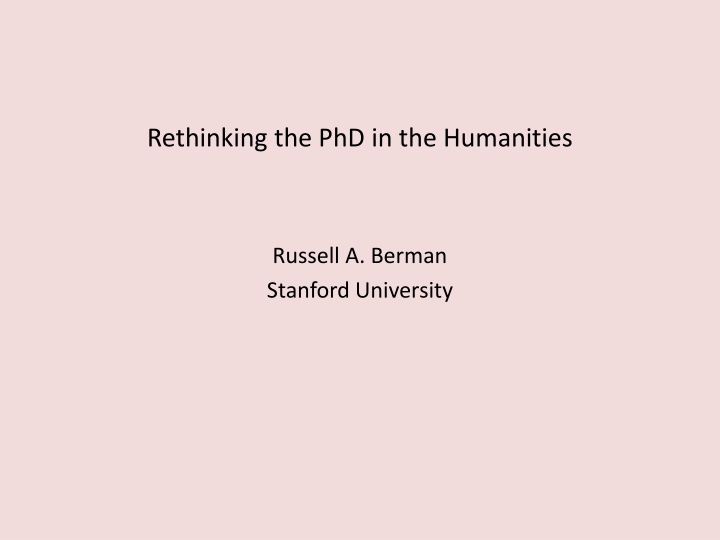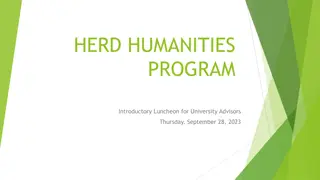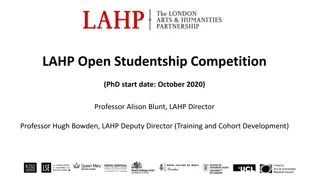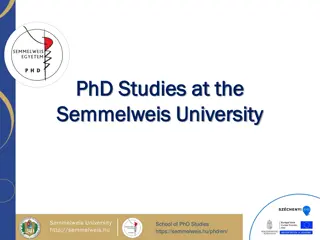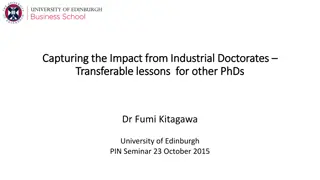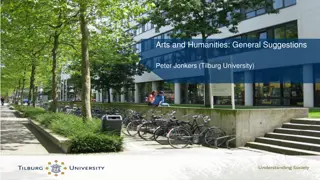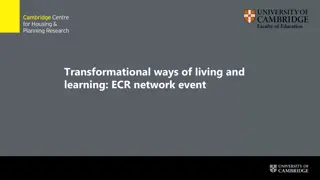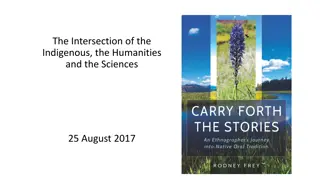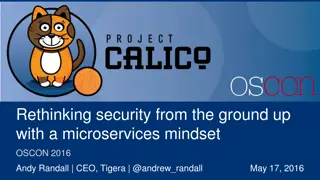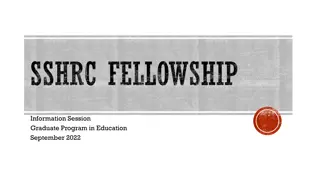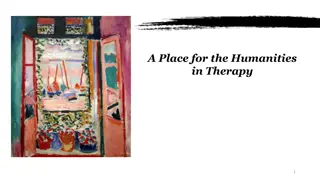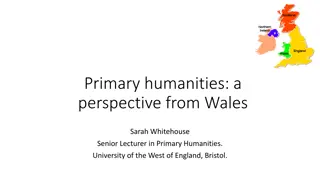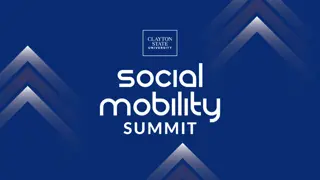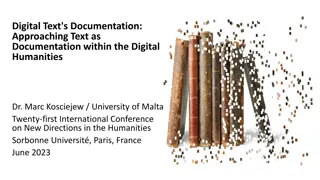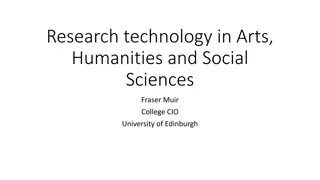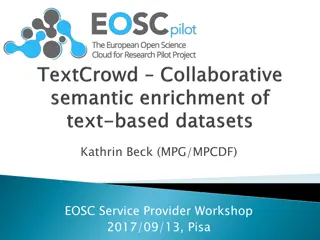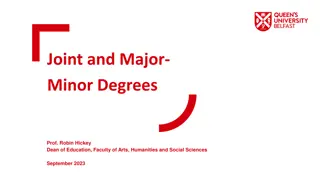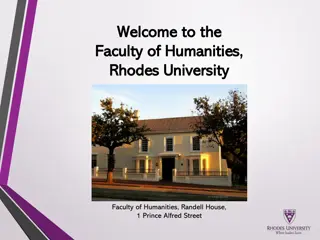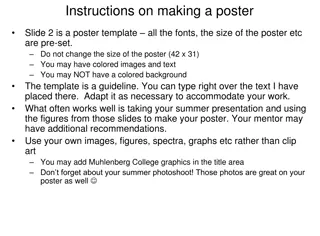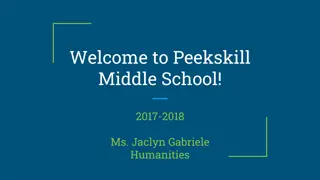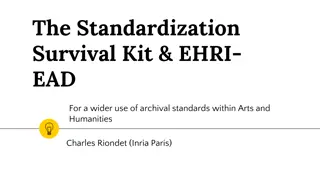Rethinking the PhD in the Humanities: Challenges and Solutions
This collection of images highlights the evolving landscape of doctoral education in the humanities. It delves into the importance of doctoral education, reasons for urgent change, and key issues affecting post-2008 academia. The visuals also feature data on job placements, completion rates, and the evolving academic job market, shedding light on the critical discussions surrounding doctoral education in the humanities.
Download Presentation

Please find below an Image/Link to download the presentation.
The content on the website is provided AS IS for your information and personal use only. It may not be sold, licensed, or shared on other websites without obtaining consent from the author.If you encounter any issues during the download, it is possible that the publisher has removed the file from their server.
You are allowed to download the files provided on this website for personal or commercial use, subject to the condition that they are used lawfully. All files are the property of their respective owners.
The content on the website is provided AS IS for your information and personal use only. It may not be sold, licensed, or shared on other websites without obtaining consent from the author.
E N D
Presentation Transcript
Rethinking the PhD in the Humanities Russell A. Berman Stanford University
Importance of Doctoral Education Contributions to the Social Good Intellectual and Career Growth for the Student Vitality of the Research Community in its Pursuit of Knowledge
Why Change Now? Many current problems are hardly new especially the limited academic job market. What makes these matters especially urgent today?
Why Change Now? Long Standing Problems Reach a Tipping Point: Post 2008 Academic Job Market Student Debt Crisis Casualization of the Academic Workforce Time To Degree
Doctorate Recipients in English Reported on the U. S. Survey of Earned Doctorates and MLA Job Information List Ads in English, 2004 05 to 2011 12 2,000 1,800 1,600 JIL ads in English 1,400 1,200 PhD recipients in English (SED) 1,000 800 Ads tagged as tenure-track assistant professor positions 600 400 200 0 2004 05 2005 06 2006 07 2007 08 2008 09 2009 10 2010 11 2011 12
Doctorate Recipients in Spanish Reported on the U. S. Survey of Earned Doctorates and MLA Job Information List Ads Tagged for Spanish, 2004 05 to 2011 12 700 600 500 JIL ads tagged for Spanish 400 PhD recipients in Spanish (SED) 300 JIL ads tagged for Spanish and tenure-track assistant professor 200 100 0 2004 05 2005 06 2006 07 2007 08 2008 09 2009 10 2010 11 2011 12
Percentage of Doctorate Recipients Completing Degrees in Six Years or Less, by Discipline, 1961 65 to 2006 10 70.0 60.0 50.0 40.0 30.0 20.0 10.0 0.0 Humanities Life Sciences Physical Sciences Social Sciences 1961 65 1966 70 1971 75 1976 80 1981 85 1986 90 1991 95 1996 2000 2001 05 2006 10
Initial Employment Placements of Graduates from U. S. Doctoral Programs in English, Fourteen MLA Surveys of Doctoral Student Placement, 1976 77 to 2009 10 60.0 50.0 Tenure-track appointment Non-tenure-track appointment 40.0 Postdoctoral fellowship Academic administration 30.0 Other higher education 20.0 Outside higher education Not employed 10.0 0.0 1976 77 1977 78 1978 79 1979 80 1981 82 1983 84 1986 87 1991 92 1993 94 1996 97 2000 01 2003 04 2006 07 2009 10
Initial Employment Placements of Graduates from U. S. Doctoral Programs in Languages Other than English, Fourteen MLA Surveys of Doctoral Student Placement, 1976 77 to 2009 10 60.0 50.0 Tenure-track appointment Non-tenure-track appointment 40.0 Postdoctoral fellowship Academic administration 30.0 Other higher education 20.0 Placement outside higher education Not employed 10.0 0.0 1976 771977 781978 791979 801981 821983 841986 871991 921993 941996 972000 012003 042006 072009 10
Snapshot: June 2014 Stanford DLCL 15 PhD s: 14 firm placements 2 TT placements: 14.3% 8 NTT placements: 57.1% NTT include 5 at Stanford, 1 international 4 Private Sector: 28.6% Titles: Chief Content Officer, Partner Operations, Digital Marketing Manager, Content Specialist: Trust and Safety Operations Team
Why Change Now? Opportunity to Respond to New Potentials New Forms of Collaboration and Communication Digital Scholarship: Technology Public Concern with Education (Learning Outcomes)
Framing Principles of the MLA Task Force Report Excellence Accessibility Broadened Career Paths Focus on Graduate Students Needs
Redesign the Doctoral Program Form and Pacing of Course Work Non-course-based activities: paracurriculum Modes of Evaluation Character of Qualifying Exams The Dissertation Prospectus
Engage More Deeply with Technology Programs should link technology training to student research questions, supporting this training as they would language learning or archival research and partnering where appropriate outside the department to match students with relevant mentors or practicum experiences.
Reimagine the Dissertation Departments should expand the spectrum of forms the dissertation may take. [ ] Departments should advocate the validity of alternatives to the proto-print book dissertation as a basis for initial hire. They should similarly challenge expectations for book publication as the primary criterion for conferral of tenure.
Reduce the Time To Degree Departments should design programs that can normally be completed in five years. Because individual circumstances may vary, some students may take longer, while others will be able to complete more quickly.
Strengthen Teaching Preparation Departments should provide sufficient teaching opportunities for students and ensure that their teaching experience is designed to enhance their professional development. Teaching opportunities should be accompanied by course work, practical experience, and mentoring.
Expand Professionalization Opportunities While the opportunities for expanding the repertoire of skills will no doubt become part of currently established courses, departments should also build partnerships with other units on campus a humanities center or institute, a digital lab in the library, or the graduate school.
Use the Whole University Community Doctoral programs should look beyond their departmental boundaries and seek out professionals in the university, many of whom may not be regular faculty members, who can provide useful mentorship to graduate students, as a group and individually.
Redefining DGS and Placement Officer DGS as Change Agent Placement Officer and Broader Perspectives for advising
Validate Diverse Career Outcomes Departments should guarantee that graduate students understand the full range of potential career outcomes.
Rethink Admissions Practices Departments should develop admissions practices and policies appropriate to the changing character of doctoral education and the broadened range of career opportunities.
Points of Controversy Critics Call to Protect Jobs by Limiting Access Defense of the Long Time to Degree as Necessary Insistence that the PhD is only for Professorships See my comments in IHE July 21, 2014
Why This Can Happen Job Market Changes Reforms Already Under Way TTD is declining already (if slowly) But Need for Leadership and Dedication
